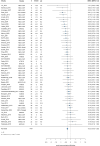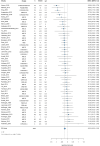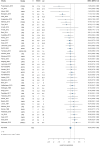Placebo response in pharmacological and dietary supplement trials of autism spectrum disorder (ASD): systematic review and meta-regression analysis
- PMID: 32847616
- PMCID: PMC7448339
- DOI: 10.1186/s13229-020-00372-z
Placebo response in pharmacological and dietary supplement trials of autism spectrum disorder (ASD): systematic review and meta-regression analysis
Abstract
Background: Placebo response in autism spectrum disorder (ASD) might dilute drug-placebo differences and hinder drug development. Therefore, this meta-analysis investigated placebo response in core symptoms.
Methods: We searched ClinicalTrials.gov , CENTRAL, EMBASE, MEDLINE, PsycINFO, WHO-ICTRP (up to July 8, 2018), and PubMed (up to July 4, 2019) for randomized pharmacological and dietary supplement placebo-controlled trials (RCTs) with a minimum of seven days of treatment. Single-group meta-analyses were conducted using a random-effects model. Standardized mean changes (SMC) of core symptoms in placebo arms were the primary outcomes and placebo positive response rates were a secondary outcome. Predictors of placebo response were investigated with meta-regression analyses. The protocol was registered with PROSPERO ID CRD42019125317 .
Results: Eighty-six RCTs with 2360 participants on placebo were included in our analysis (87% in children/adolescents). The majority of trials were small, single-center with a duration of 8-12 weeks and published after 2009. Placebo response in social-communication difficulties was SMC = - 0.32, 95% CI [- 0.39, - 0.25], in repetitive behaviors - 0.23[- 0.32, - 0.15] and in scales measuring overall core symptoms - 0.36 [- 0.46, - 0.26]. Overall, 19%, 95% CI [16-22%] of participants were at least much improved with placebo. Caregiver (vs. clinician) ratings, lower risk of bias, flexible-dosing, larger sample sizes and number of sites, less recent publication year, baseline levels of irritability, and the use of a threshold of core symptoms at inclusion were associated with larger placebo response in at least a core symptom domain.
Limitations: About 40% of the trials had an apparent focus on core symptoms. Investigation of the differential impact of predictors on placebo and drug response was impeded by the use of diverse experimental interventions with essentially different mechanisms of action. An individual-participant-data meta-analysis could allow for a more fine-grained analysis and provide more informative answers.
Conclusions: Placebo response in ASD was substantial and predicted by design- and participant-related factors, which could inform the design of future trials in order to improve the detection of efficacy in core symptoms. Potential solutions could be the minimization and careful selection of study sites as well as rigorous participant enrollment and the use of measurements of change not solely dependent on caregivers.
Keywords: Autism spectrum disorder; Placebo; Trials.
Conflict of interest statement
In the last 3 years, Stefan Leucht has received honoraria as a consultant/advisor and/or for lectures from LB Pharma, Otsuka, Lundbeck, Boehringer Ingelheim, LTS Lohmann, Janssen, Johnson&Johnson, TEVA, MSD, Sandoz, SanofiAventis, Angelini, Recordati, Sunovion, and Geodon Richter. David Fraguas has been a consultant and/or has received fees from Angelini, Eisai, IE4Lab, Janssen, Lundbeck, and Otsuka. He has also received grant support from Instituto de Salud Carlos III (Spanish Ministry of Science, Innovation and Universities) and from Fundación Alicia Koplowitz. Mara Parellada has received educational honoraria from Otsuka, research grants from FAK and Fundación Mutua Madrileña (FMM), Instituto de Salud Carlos III (Spanish Ministry of Science, Innovation and Universities) and European ERANET and H2020 calls, travel grants from Otsuka and Janssen. Consultant for Exeltis and Servier. Celso Arango has been a consultant to or has received honoraria or grants from Acadia, Angelini, Gedeon Richter, Janssen Cilag, Lundbeck, Otsuka, Roche, Sage, Sanofi, Servier, Shire, Schering Plough, Sumitomo Dainippon Pharma, Sunovion and Takeda. In the last 3 years, Maximilian Huhn has received speakers honoraria from Janssen. Declan Murphy has received consulting fees from Roche. The other authors have nothing to disclose.
Figures





References
-
- American Psychiatric A. Diagnostic and statistical manual of mental disorders (DSM-5®): American Psychiatric Pub. 2013.
-
- Baio J, Wiggins L, Christensen DL, Maenner MJ, Daniels J, Warren Z, Kurzius-Spencer M, Zahorodny W, Robinson Rosenberg C, White T, et al. Prevalence of Autism spectrum disorder among children aged 8 years—autism and developmental disabilities monitoring network, 11 Sites, United States, 2014. MMWR Surveill Summ. 2018;67(6):1–23. - PMC - PubMed
-
- Baxter AJ, Brugha TS, Erskine HE, Scheurer RW, Vos T, Scott JG. The epidemiology and global burden of autism spectrum disorders. Psychol Med. 2015;45(3):601–613. - PubMed
-
- Buescher AVS, Cidav Z, Knapp M, Mandell DS. Costs of Autism Spectrum disorders in the United Kingdom and the United States costs of ASD in the UK and US costs of ASD in the UK and US. JAMA Pediatrics. 2014;168(8):721–728. - PubMed
-
- Howes OD, Rogdaki M, Findon JL, Wichers RH, Charman T, King BH, Loth E, McAlonan GM, McCracken JT, Parr JR, et al. Autism spectrum disorder: consensus guidelines on assessment, treatment and research from the British Association for Psychopharmacology. J Psychopharmacol. 2018;32(1):3–29. - PMC - PubMed
Publication types
MeSH terms
Grants and funding
LinkOut - more resources
Full Text Sources
Medical

